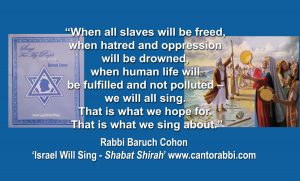ISRAEL WILL SING – Ex.15, Shabat Shirah – by Rabbi Baruch Cohon
This week we observe the annual Sabbath of Song, when the Torah reader intones the jubilant Song of Moses with its special melody – a paean of gratitude and joy, celebrating the Israelites crossing the Red Sea on dry land, and reaching freedom after centuries of Egyptian slavery. Pursuing forces sank under the returning waves. Just a few years ago, modern archeologists discovered some gold wheel-covers of Pharaoh’s chariots in the Red Sea’s sands. Yes, it happened. Moses had plenty to sing about.
Shirat haYam – the Song of the Sea – prompts the name of this special Sabbath, called Shabat Shirah – the Sabbath of Song. This week many congregations will hold concerts of Jewish music, and feature musical services, encouraging and rewarding the work of contemporary Jewish composers. Like other colleagues, I relish the nakhes of attending a service or concert, perhaps led by a former student, that will feature a composition of mine. Indeed, music and song play a huge role in our lives. Biblically, this Song of Moses is just the first of the great songs. In the Book of Numbers we read the people’s song of elation at finding a well in the desert. In Deuteronomy, one of the last acts of Moses is to speak the verses of Haazinu, his testament, “in the ears of the whole community of Israel, the words of this song:
Listen, you heavens, and I will speak, and let the earth hear the utterance of my mouth…”
Prophets and kings continue the poetry and the music. Take Deborah’s song in the Book of Judges (this week’s Haftorah), others in Second Samuel, in Isaiah, and of course in the Psalms of David. The very last of those Psalms, #150 details a virtual catalogue of the musical instruments the Levites played in the Sanctuary, and adds dance and the human voice. Then Solomon gave us the Song of Songs, an ultimate love song, which our tradition takes symbolically as expressing the love of G-d and Israel.
So the power of song flavors our lives. The Mechilta counts 10 important songs, the first being the Song of the Sea, and the last being the song we will sing with the Messiah when he arrives. That will be the eternal song.
But before leaving those exultant ancestors on the east side of the Red Sea – Moses leading the men and Miriam leading the women – let’s look at one grammatic curiosity. The Torah does not say Az shar Moshe uv’ney Yisrael – “then Moses and the Israelites sang.” It says Az yashir Moshe – literally “then Moses and the Israelites will sing.” When all slaves will be freed, when hatred and oppression will be drowned, when human life will be fulfilled and not polluted – we will all sing. That is what we hope for. That is what we sing about. With the Messiah, with our neighbors, with each other.
Join the chorus!



